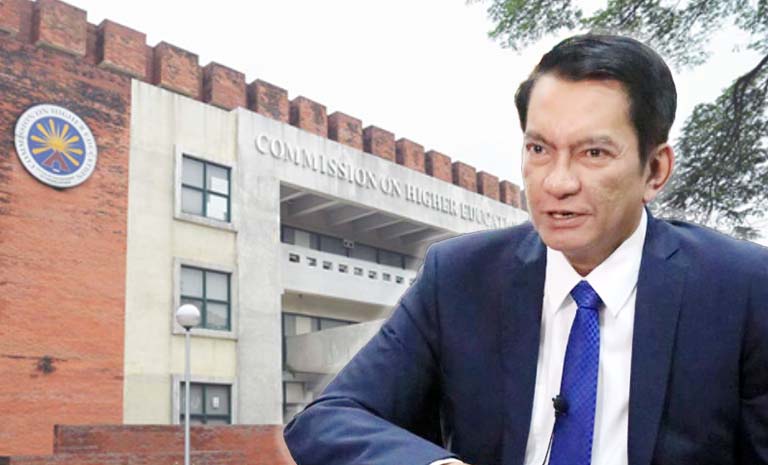
The Commission on Higher Education (CHED) has honored and presented Albay Rep. Joey Sarte Salceda the ‘Father of Free Tuition in College,’ award, a special recognition for his having crafted the Universal Access to Quality Tertiary Education (UAQTE) law.
CHED Chairman Prospero ‘Popoy’ de Vera and Commissioner Aldrin Darilag, together with Atty Ryan Estevez, executive director of the Unified Student Financial Assistance System for Tertiary Education presented the award to Salceda during the recent CHED ‘Gawad Parangal’ rites for local universities and colleges (LUCs) of local government units in the Bicol region, held in Legazpi City.
President Duterte signed the UAQTE into law as RA 10931 in 2017. It has vastly reformed and expanded the country’s college education system since then. It grants free tuition to students in all state universities and colleges (SUCs) and LUCs. Its benefits are also available to high school students and college drop-outs who opt to instead pursue technical-vocational courses or skills training programs of the Technical Education and Skills Development Authority (TESDA) and its accredited training institutions.
Popularly known as the free tuition law, the UAQTE also directly benefits middle-income families whose children may not qualify for free tuition in SUCs and LUCs but may avail of financial assistance through concessional loans when they enroll in private colleges. The
The loans are payable when they graduate and get employed and their salary level reaches the minimum annual gross income or “compulsory repayment threshold.”
In his speech during the awards rites, Salceda who chairs the House Ways and Means Committee urged the CHED and TESDA to work more closely to produce a “skills-based” workforce for real “career opportunities” in the Fourth Industrial Revolution.
Salceda said “free college tuition has clearly made a difference,” but as education demands constant reinvention, his position on tertiary education has begun to evolve. “Although employment is currently still governed by the “tyranny of college diplomas,” the Fourth Industrial Revolution demands highly competitive skills required by its globalized and ‘hyper technologized economy,’” he added,
He proposed that college students be also taught TESDA courses related to their academic discipline, so they earn both a diploma and TESDA certification when they graduate. He cited the need for closer CHED-TESDA partnership that can be most viable in community colleges, “whose graduates are in search of real career opportunities and value-adding education.”
“If we will pursue truly universal access to higher education, we must support community colleges that typically cater to the poorest and most underserved segments of the enrolled population. Nowhere does free tuition matter more than in community colleges, where many working students enroll,” he said.
In his speech, Salceda suggested that CHED and TESDA engage in a dialogue and explore ways on how to work together more closely. He promised to facilitate the dialogue and discussions. “I believe that some college courses should be taught and certified by TESDA. An electrical engineering student in college can surely also undergo certification as an electrician. Even students in private schools should acquire TESDA-certifiable allied skills,” he said, pointing out that “the world now needs more skills than diplomas, so CHED has to ensure that college graduates are truly equipped with skills.”
Salceda noted that with UAQTE, the number of college graduates has increased significantly, from an average of 5.2% every year for the 10 years before it, to an average of 6.42% after the law took effect, and students are also more likely to graduate. In the years before UAQTE, he said, graduating students averaged only about 16.24% of all enrolled students, and they now average 23.45% of enrollees at all year levels, after UAQTE.
Community colleges, he said, also grew from 107 before UAQTE to 121 as of 2020, reputedly the fastest growth in their number in recent history. “In Albay alone, we doubled up. As of this year, we now have nine community colleges, the most of any province in the country,” he added. The UAQTE law was patterned after the Albay free tertiary education program Salceda experimented on when he was provincial governor for nine years or until 2016.
In his briefings as principal sponsor of the recently approved Corporate Recovery and Tax Incentives for Enterprises (CREATE) Act, he said one of the common complaints of BPO firms is that “Filipino college graduates could “could speak great English, read well and write well, but are unable to solve the customer’s problems and add value to their clients.”
“As a result, BPOs spend significantly on training. Even with so much youth unemployment, BPOs could not find enough skilled workers to fill their vacancies. This situation is an existential threat for the Philippines in a globalized, competitive world economy driven by skills,” he added.
“To create new jobs to replace the ones we lost to COVID-19, we must attract new investments and create new industries. To get these jobs, we need to convince the world that Filipinos can get these jobs done well. Touting our cheap labor will no longer work. The world demands added value,” Salceda stressed.
“I invite CHED and TESDA to work with me. Together, we can make sure diplomas produced by UAQTE are backed by real skills. Your agencies can no longer work in silos. To remove the stigma of being “just a TESDA graduate,” TESDA itself must become part of the college system. The college system must make use of the potential of TESDA education for real life,” he said.